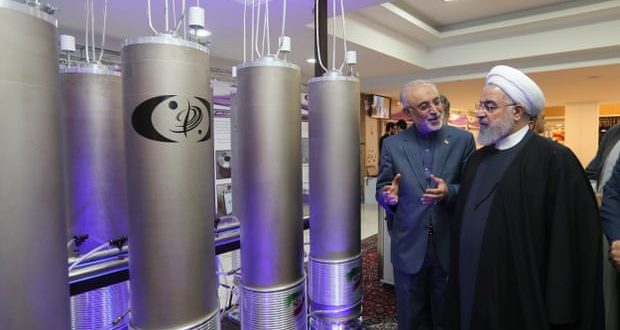Experts warn of dangerous consequences as nuclear deal continues to unravel
Iran has announced a tenfold increase in enriched uranium production as Tehran backs away from its nuclear deal with the west.
Ali Akbar Salehi, the head of Iran’s atomic energy organisation, said enriched uranium production was now at 5kg per day, up from 450g two months ago. The announcement coincided with the 40th anniversary of the Iranian takeover of the US embassy.
The nuclear deal has been unravelling since May 2018 when Donald Trump withdrew the US and reimposed sanctions on Iran. Tehran said earlier this year it would gradually shed its commitments under the deal and is due to announce its next step within days unless the US lifts economic sanctions.
The production increases were made possible by the introduction of two new advanced centrifuges, one of which is undergoing testing. Salehi said Iran was now operating 60 IR-6 advanced centrifuges, a violation of the deal.
Salehi added that Iranian engineers were also working on a prototype called IR-9 and said that this would be 50 times faster than the first-generation IR-1s allowed under the accord.
Iran said it had now removed all its IR-1 centrifuges and is only using advanced models, leading to the sharp increase in production. It has been calculated that the new centrifuges mean it would take Iran a year to develop a nuclear bomb, something it insists it has no intention of doing.
The deal was brokered in 2015 and included Iran agreeing to limit its nuclear activities in return for the lifting of economic sanctions, in particular on oil exports.
It is not clear how the European Union will react to the latest step, but so far the EU has not put the whole nuclear agreement into review, which would be the first move towards its suspension and possible collapse.
Sanam Vakil, a Chatham House senior research fellow, warned: “There is now a serious risk of a dangerous miscalculation with dangerous consequences if Iran’s [latest] step goes too far.”
The EU sent an early warning shot on Monday, saying its support for the nuclear deal depended on Tehran fulfilling its commitments. The German foreign minister, Heiko Maas, said the announcement was unacceptable and was putting the whole nuclear deal at risk.
Tehran says it is no longer prepared to wait for Europe to fulfil its commitment to boost trade with Iran, made at the time of the deal in 2015.
Europe has made promises to find ways to circumvent the US sanctions, but little that is substantial or legally watertight has emerged from extensive talks between Tehran and the three main European powers, Britain, France and Germany. Senior Iranians have blamed a general European strategic weakness in part caused by the distraction of Brexit.
In previous steps away from the deal, on 1 July Iran increased its stockpile of enriched uranium to beyond a 300kg maximum set by the deal, and a week later it announced it had exceeded a 3.67% cap on the purity of its uranium stocks. It fired up advanced centrifuges to boost its enriched uranium stockpiles on 7 September.
In a sign that Tehran has decided it is not worth negotiating with Trump, Iran’s supreme leader, Ayatollah Ali Khamenei, called French president Emmanuel Macron’s efforts to set up talks between Iran and the US to break the impasse “naive”.
Macron’s efforts to initiate a phone call between Trump and his Iranian counterpart, Hassan Rouhani, on the sidelines of the UN general assembly in September ended in failure and Rouhani has stressed he would only hold talks with the US if sanctions were lifted first.
The Guardian
 Lebanese Ministry of Information
Lebanese Ministry of Information



